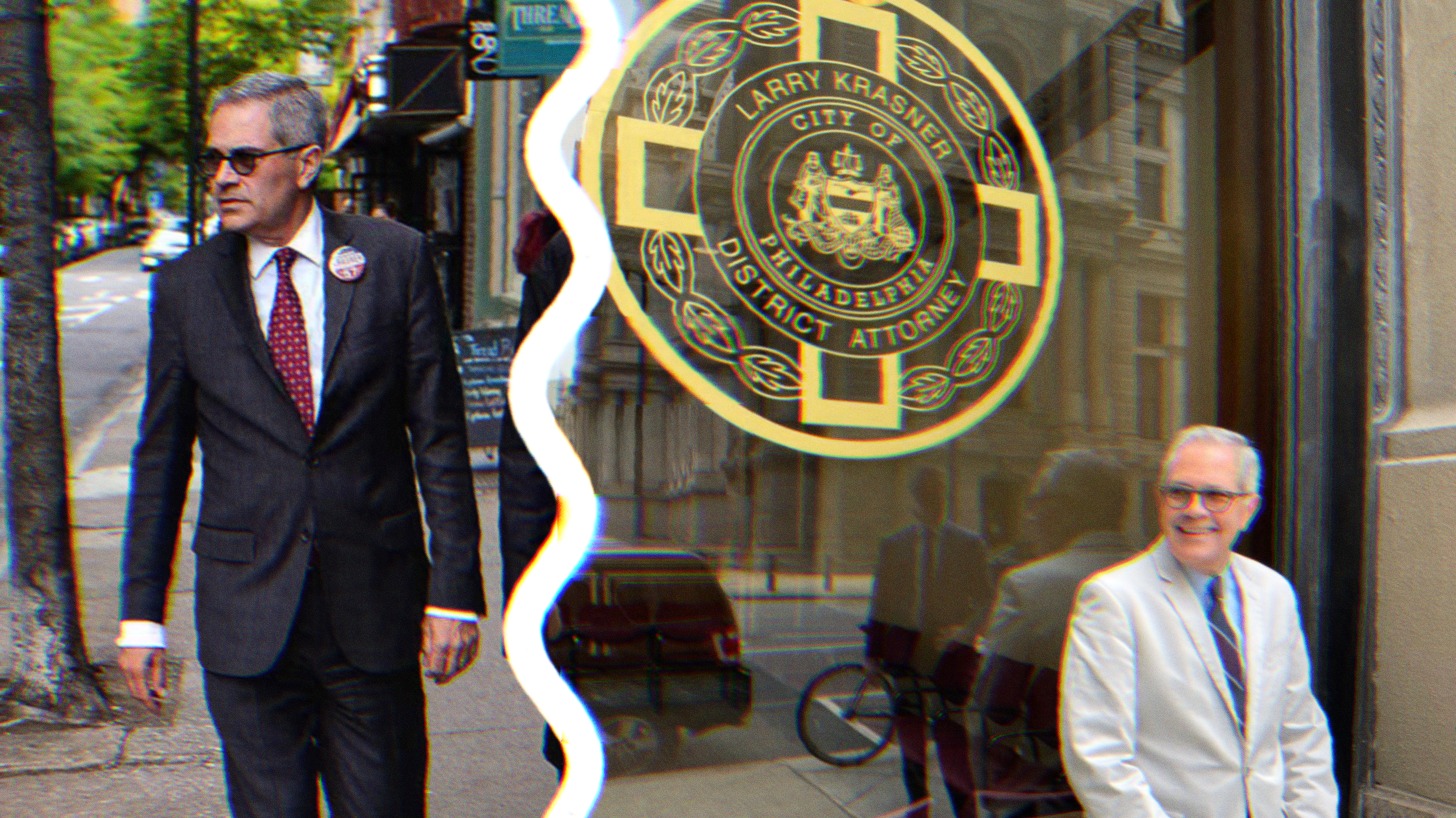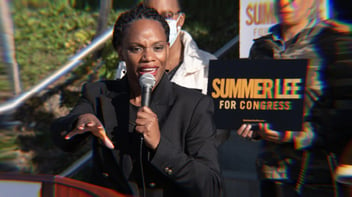Progressive Spotlight: Larry Krasner.
Krasner’s Reform Agenda.
 Image Description: Two photos of Larry Krasner; one of him walking down the street wearing a campaign button, the other in front of his office window where an emblem is featured, which says Larry Krasner, District Attorney, City of Philadelphia
Image Description: Two photos of Larry Krasner; one of him walking down the street wearing a campaign button, the other in front of his office window where an emblem is featured, which says Larry Krasner, District Attorney, City of Philadelphia
In 2017, Larry Krasner upended the criminal legal system when he was elected district attorney of Philadelphia. Krasner earned the distinction of being one of America’s first “progressive prosecutors” and his ascension infuriated the tough-on-crime political class instrumental in making the United States the incarceration capital of the world.
So threatened were they by Krasner’s victory that an informal coalition made up of law enforcement, police unions, and elected officials in Pennsylvania led a scorched-earth campaign to delegitimize him and the movement he helped activate. Against the will of the voters, who were inspired to elect a reformer who could push back against a system that disproportionately targeted marginalized communities, Pennsylvania Republicans unsuccessfully attempted to strip him of his powers and remove him from office entirely.
Despite the fear-mongering about his policies turning Philadelphia into a Gotham-esque crime den, Krasner won re-election in 2021 by a 44 percent margin. If his re-election was considered a fait accompli considering the Democratic advantage in the city, then perhaps the party primary serves as a better measure of voter sentiment. In that race, which effectively pitted Krasner against the powerful Fraternal Order of Police, he ended up doubling his opponent’s vote total.
This context is important when considering the corporate media’s bias against left candidates generally. Throw “criminal justice” into the mix and you end up with salacious stories, often fueled by unreliable crime data, that creates a perception that society is experiencing perpetual crime waves. How else do we explain polling in which more than three-quarters of Americans think crime was higher in 2023 than the previous year when the opposite was true?
“Media content is shaped by economic and marketing considerations that override traditional journalistic criteria for newsworthiness,” reads an analysis from the William and Mary Law Review. “This trend is apparent in local and national television’s treatment of crime, in which the extent and style of news stories about crime are adjusted to meet perceived viewer demand and advertising strategies, which frequently emphasize particular demographic groups with a taste for violence.”
In 2021, the influential NeimanLab published an article titled “Defund the crime beat” that noted: “Study after study shows how the media’s overemphasis on crime makes people feel less safe than they really are and negatively shapes public policy around the criminal–legal system. And study after study shows that it’s racist and inhumane.”
Pew Research Center, which has been analyzing polling data for decades, said that despite huge decreases in violent and property crime rates between 2008 and 2016, voters at the time thought the opposite was true, adding: “Americans’ perceptions of crime are often at odds with the data.”
Along with crime coverage itself, there’s little discussion in the media about how powerful local prosecutors actually are—power that comes from having discretion over which crimes they elect to prosecute. In the majority of races across the country involving an incumbent district attorney or related position, the incumbent runs uncontested 75 percent of the time, according to a study conducted by the Prosecutors and Politics Project at UNC School of Law.
That brings us back to Krasner. While hardly the only progressive prosecutor who has made waves in recent years by advocating for a reform agenda to lessen the impacts of incarceration, he’s effectively been made the face of the movement. And with the political rhetoric often obscuring reality, there’s less and less space to discuss actual policies. Take for instance Krasner’s Conviction Integrity Unit, which since 2018 has exonerated more than 40 people.
Along with revisiting cases in which people may have been wrongfully convicted, Krasner reduced jail population during his first term in office, lived up to his pledge of not seeking out death penalty cases, and prosecuted fewer cases. According to the DA office’s own database, the number of cases filed by Krasner’s administration dropped by about 6,000 in his first year, setting off a precipitous decline that intersected with the COVID-19 pandemic, which saw cities nationwide attempting to arrest fewer people to mitigate exposure inside jails and prisons. In 2023, Krasner’s office totaled 22,709 cases, compared to over 38,000 in 2017.
Krasner has also attempted to reduce the impact of incarceration and the years people spend either on parole or probation. According to his office, “years of incarceration” is down 41,000 years compared to the period between 2014 and 2017, and years of supervision is down 165,000 years.
A civil rights attorney before coming into office, Krasner has sought to reduce racial disparities in the criminal justice system. Last summer, his office released a report that found, “Black defendants were charged at disproportionately higher rates relative to other groups in seven of the eight most common criminal charge categories” between 2015 and 2022. The report also noted that formerly red-lined areas of the city have high concentrations of “poverty, unemployment, litter, health problems, and eviction.”
“Advancing racial justice is among the most important goals of the movement to reform the criminal legal system,” Krasner wrote in the report. “Minimal progress has been made on this front, and it will take a massive, collaborative effort in society and among criminal justice actors to end the racist outcomes in the criminal justice system.”
Krasner hasn’t been perfect. His inability to end cash bail—which creates a two-tiered system of justice—has frustrated supporters. Yet he continues to try to reform the system from the inside despite everything thrown his way.
Image Source
- krasnerforda.com. Changes were made.
- Larry Krasner on Facebook: Changes were made.
Rashed Mian is the managing editor of the award-winning News Beat podcast and co-founder of the newly launched Free The Press (FTP) Substack newsletter. Throughout his career, he has reported on a wide range of issues, with a particular focus on civil liberties, systemic injustice and U.S. hegemony. You can find Rashed on X @rashedmian and on Bluesky @rashedmian.bsky.social.


